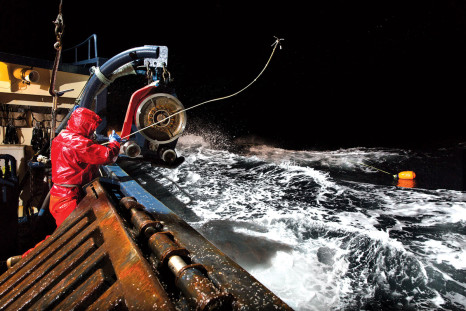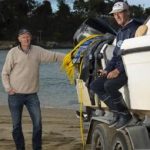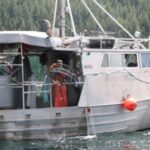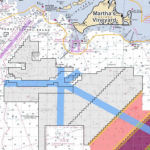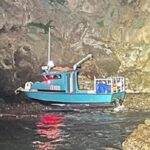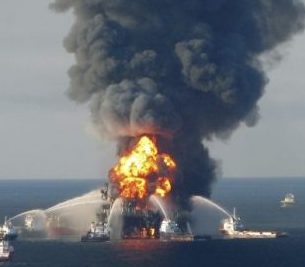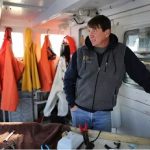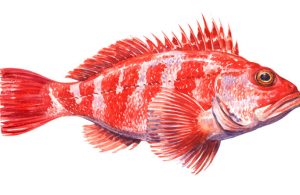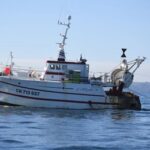Category Archives: Western Pacific

Who’s really in charge of U.S. fisheries? – Nils Stolpe, FishnetUSA
An Oligarchy is defined as “a country, business, etc., that is controlled by a small group of people” – Ancient City Shrimp is an eight minute YouTube video (Click here) produced by the St. Augustine Lighthouse Museum that examines St. Augustine’s past as one of several centers of commercial shrimping in Florida. Unfortunately – or perhaps tragically is a better fit – Florida’s shrimp fleet is only a shadow of what it once was. One of the reasons for this is the imposition of unrealistic regulations on U.S. shrimpers that has made the fishery much less profitable than it used to be. A history lesson or two. Read the rest here 16:27
Activists, NMFS face off in federal court over ahi quotas “This is allowing them to fish without limits,” ??
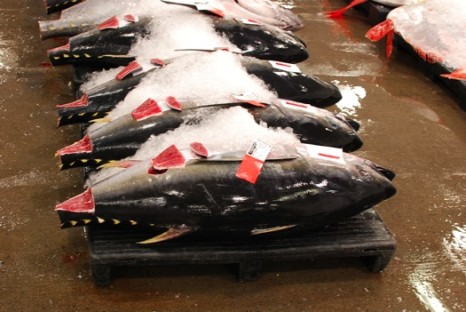 Environmentalists on Friday asked a federal judge to stop the National Marine Fisheries Service from allowing Hawaii-based fishermen to attribute some of the bigeye tuna they catch to U.S. territories. They argue the agency is enabling the fishermen to circumvent international agreements aimed at controlling the overfishing of the popular tuna species known as ahi. Earthjustice attorney David Henkin told U.S. District Judge Leslie Kobayashi the fisheries service acted illegally when it created a framework allowing Hawaii longline fishermen to record some of their catch as having been caught by fishermen in Guam, the Northern Mariana Islands and American Samoa. Read the rest here 17:26
Environmentalists on Friday asked a federal judge to stop the National Marine Fisheries Service from allowing Hawaii-based fishermen to attribute some of the bigeye tuna they catch to U.S. territories. They argue the agency is enabling the fishermen to circumvent international agreements aimed at controlling the overfishing of the popular tuna species known as ahi. Earthjustice attorney David Henkin told U.S. District Judge Leslie Kobayashi the fisheries service acted illegally when it created a framework allowing Hawaii longline fishermen to record some of their catch as having been caught by fishermen in Guam, the Northern Mariana Islands and American Samoa. Read the rest here 17:26
PNA urged to respect Forum decision on fisheries
 New Zealand’s Ambassador for Pacific Economic Development says the Parties to the Nauru Agreement (PNA) should respect the wishes of Pacific leaders on how to manage regional fisheries. This comes after scathing criticism from the PNA chief executive after the Pacific Island Forum leaders decision to look into the merits of replacing the PNA’s Vessel Day Scheme with a New Zealand style quota management system. New Zealand’s Shane Jones says regional leaders want a year given to look into the future of tuna fisheries management in the Pacific and,,, Read the rest here 11:55
New Zealand’s Ambassador for Pacific Economic Development says the Parties to the Nauru Agreement (PNA) should respect the wishes of Pacific leaders on how to manage regional fisheries. This comes after scathing criticism from the PNA chief executive after the Pacific Island Forum leaders decision to look into the merits of replacing the PNA’s Vessel Day Scheme with a New Zealand style quota management system. New Zealand’s Shane Jones says regional leaders want a year given to look into the future of tuna fisheries management in the Pacific and,,, Read the rest here 11:55
WPRFMC Press Release – Milestone Reached in Setting of New Bottomfish ACLs for US Pacific Island Territories
 HONOLULU (18 Sept. 2015) A milestone was reached this week in the setting of the 2016 and 2017 annual catch limits (ACLs) for federally managed bottomfish fisheries in the US Territories of American Samoa, Guam and the Commonwealth of the Northern Mariana Islands (CNMI). The current ACLs of 101,000 pounds; 66,800 pounds; and 228,000 pounds, respectively, for the territories were initially set for fishing year 2013 based on a 2012 stock,,, Read the rest here 19:40
HONOLULU (18 Sept. 2015) A milestone was reached this week in the setting of the 2016 and 2017 annual catch limits (ACLs) for federally managed bottomfish fisheries in the US Territories of American Samoa, Guam and the Commonwealth of the Northern Mariana Islands (CNMI). The current ACLs of 101,000 pounds; 66,800 pounds; and 228,000 pounds, respectively, for the territories were initially set for fishing year 2013 based on a 2012 stock,,, Read the rest here 19:40
NOAA urged to expedite decision to allow the American Samoa purse seiner fleet to fish in the high seas.
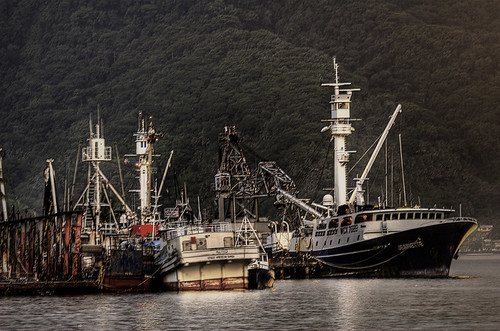 Tri Marine International’s CEO, Mr. Renato Curto and Chief Operating Officer, Mr. Joe Hamby visited senior NOAA and Department of Commerce officials in Washington, D.C. this week urging them to expedite their decision on the petition to allow the American Samoa purse seiner fleet to fish in the high seas. NOAA’s public comment period on the petition ended on August 17th.Over 100 comments were received, only four of which were against the petition. Heidi Happonen, spokesperson for Tri Marine said with such broad support for restoring access to the high seas,,, Read the rest here 12:52
Tri Marine International’s CEO, Mr. Renato Curto and Chief Operating Officer, Mr. Joe Hamby visited senior NOAA and Department of Commerce officials in Washington, D.C. this week urging them to expedite their decision on the petition to allow the American Samoa purse seiner fleet to fish in the high seas. NOAA’s public comment period on the petition ended on August 17th.Over 100 comments were received, only four of which were against the petition. Heidi Happonen, spokesperson for Tri Marine said with such broad support for restoring access to the high seas,,, Read the rest here 12:52
Pew threatens to get Pacific bluefin tuna banned from international trading
 An international body that monitors fisheries in most of the Pacific Ocean ended a meeting in Japan on Thursday without agreement on fresh measures to protect the dwindling bluefin tuna. The lack of a required three-quarters quorum prevented any agreement, since representatives from China, the Cook Islands, Vanuatu and the Philippines did not attend. So any decisions on new long-term measures were pushed back to 2016, the Japanese Fisheries Agency said. Further inaction would likely prompt efforts by conservationists to get Pacific bluefin tuna banned from international trading, said a statement by The Pew Charitable Trusts, Read the rest here 11:27
An international body that monitors fisheries in most of the Pacific Ocean ended a meeting in Japan on Thursday without agreement on fresh measures to protect the dwindling bluefin tuna. The lack of a required three-quarters quorum prevented any agreement, since representatives from China, the Cook Islands, Vanuatu and the Philippines did not attend. So any decisions on new long-term measures were pushed back to 2016, the Japanese Fisheries Agency said. Further inaction would likely prompt efforts by conservationists to get Pacific bluefin tuna banned from international trading, said a statement by The Pew Charitable Trusts, Read the rest here 11:27
More division on Large Vessel Protected Area (LVPA) Amendment
 The US National Marine Fisheries Service proposal to allow large US flagged longliners to fish within certain boundaries of the waters now limited to alia fishing has attracted both support and opposition. NMFS is accepting public comments until Sept. 24th on the Western Pacific Fishery Management Council’s recommendation to allow, Local longline vessel owner Edgar Feliciano says he supports amending the LVPA so that U.S. flagged longline vessels, owned and operated in American Samoa can deliver their catch to the local canneries. Read the rest here 10:24
The US National Marine Fisheries Service proposal to allow large US flagged longliners to fish within certain boundaries of the waters now limited to alia fishing has attracted both support and opposition. NMFS is accepting public comments until Sept. 24th on the Western Pacific Fishery Management Council’s recommendation to allow, Local longline vessel owner Edgar Feliciano says he supports amending the LVPA so that U.S. flagged longline vessels, owned and operated in American Samoa can deliver their catch to the local canneries. Read the rest here 10:24
Hawaii’s longline fleet dodges hurricanes – Can they survive the Enviro Tsunami?
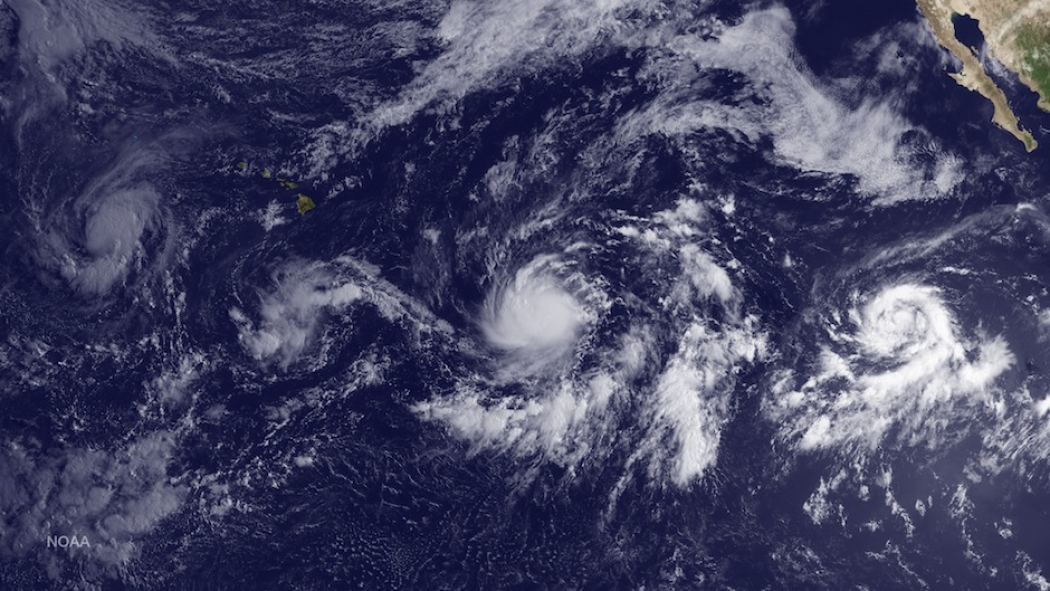 Bigeye tuna caught by Hawaii’s longline industry is in short supply right now as the fleet dodges Hurricane Ignacio and Hurricane Jimena. Some longline vessels that headed out, turned around without catching anything to avoid the powerful storms. In August, Hawaii’s longline fleet hit the bigeye tuna catch limit of 3,502 metric tons established by the Western and Central Pacific Fisheries Commission. Conservation groups, however, have filed a lawsuit to block the change,,, Video, Read the rest here 08:23
Bigeye tuna caught by Hawaii’s longline industry is in short supply right now as the fleet dodges Hurricane Ignacio and Hurricane Jimena. Some longline vessels that headed out, turned around without catching anything to avoid the powerful storms. In August, Hawaii’s longline fleet hit the bigeye tuna catch limit of 3,502 metric tons established by the Western and Central Pacific Fisheries Commission. Conservation groups, however, have filed a lawsuit to block the change,,, Video, Read the rest here 08:23
Fishing Group Sanford it quitting tuna fishing in the South Pacific blaming high costs and low returns.
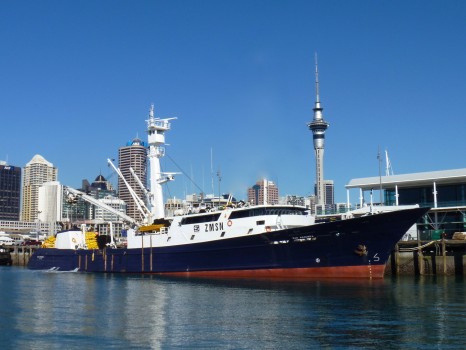 Fishing group Sanford will quit its underperforming Pacific tuna business and put the unit’s fleet up for sale. The Auckland-based company has sold its San Nanumea vessel and is in talks with a potential buyer of San Nikunau, its other Pacific tuna ship, after reviewing the viability of the business, Sanford said. On April 9, it entered into a conditional agreement to sell both international purse seiner vessels, according to Sanford’s interim report released in June. Sanford sold one of its international purse seiners last year,,, Read the rest here 16:58
Fishing group Sanford will quit its underperforming Pacific tuna business and put the unit’s fleet up for sale. The Auckland-based company has sold its San Nanumea vessel and is in talks with a potential buyer of San Nikunau, its other Pacific tuna ship, after reviewing the viability of the business, Sanford said. On April 9, it entered into a conditional agreement to sell both international purse seiner vessels, according to Sanford’s interim report released in June. Sanford sold one of its international purse seiners last year,,, Read the rest here 16:58
Governor Lolo Moliga relays American Samoa Tuna Industry concerns to Coast Guard
 Governor Lolo Moliga has asked that the US Coast Guard inform the American Samoa Fisheries Task Force whenever a fishing boat is held for longer than 24 hours. And that the canneries routinely are frustrated in their fish procurement operations when boat owners or reefer carrier owners refuse to deliver to American Samoa out of concern for what they perceive to be over zealous Coast Guard boarding parties and inspections. The effect of this he said is that fish that could come to our canneries are lost to other markets that are not guarded by the Coast Guard. The governor told the Admiral this is disturbing on multiple levels. Read the rest here 10:36
Governor Lolo Moliga has asked that the US Coast Guard inform the American Samoa Fisheries Task Force whenever a fishing boat is held for longer than 24 hours. And that the canneries routinely are frustrated in their fish procurement operations when boat owners or reefer carrier owners refuse to deliver to American Samoa out of concern for what they perceive to be over zealous Coast Guard boarding parties and inspections. The effect of this he said is that fish that could come to our canneries are lost to other markets that are not guarded by the Coast Guard. The governor told the Admiral this is disturbing on multiple levels. Read the rest here 10:36
Ocean Global Fisheries withdraws objection to petition
 The Partner and Owner of Ocean Global Fisheries and Sea Global Fisheries, Mr. Douglas Hines, now agrees that the US fleet and vessels operating our of American Samoa may be experiencing a disproportionate burden and is hoping that the National Marine Fisheries Service is able to address the concerns raised in Tri Marine’s petition for exemption from the catch limits on fishing in the high seas. There are 37 US purse seiners fishing in this area of which only 18 deliver their catches to the local canneries. Mr. Hines’ companies represent purse seiners that dont send their catches here. Read the rest here 12:21
The Partner and Owner of Ocean Global Fisheries and Sea Global Fisheries, Mr. Douglas Hines, now agrees that the US fleet and vessels operating our of American Samoa may be experiencing a disproportionate burden and is hoping that the National Marine Fisheries Service is able to address the concerns raised in Tri Marine’s petition for exemption from the catch limits on fishing in the high seas. There are 37 US purse seiners fishing in this area of which only 18 deliver their catches to the local canneries. Mr. Hines’ companies represent purse seiners that dont send their catches here. Read the rest here 12:21
Lauren Reid: The Truth About Tuna – Sailing to the Front Line of Pacific Tuna Fisheries
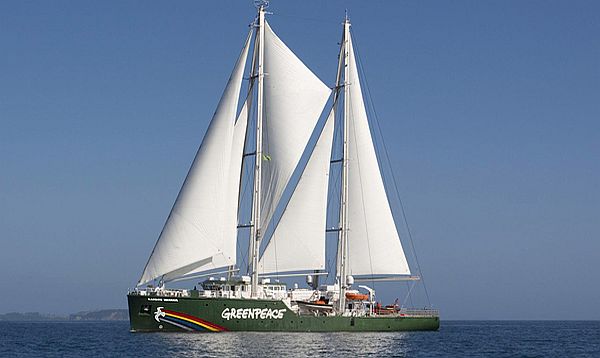 With recent stories of overfishing, shark finning, and human rights abuses (one New York Times reporter stated that being a fisherman in some parts of the Pacific Ocean “was a job where more than 50 percent of workers report their boss killing a co-worker”), I can’t help but feel extremely moved and heartbroken if these are true. The best way for me to comprehend how our canned tuna actually gets from sea to plate is to head to the source itself. Read Sailing to the Front Line of Pacific Tuna Fisheries – part one, Out on the High Seas – part two, Hard Life Aboard – part three, Reflections on Commercial Fishing – part four.09:35
With recent stories of overfishing, shark finning, and human rights abuses (one New York Times reporter stated that being a fisherman in some parts of the Pacific Ocean “was a job where more than 50 percent of workers report their boss killing a co-worker”), I can’t help but feel extremely moved and heartbroken if these are true. The best way for me to comprehend how our canned tuna actually gets from sea to plate is to head to the source itself. Read Sailing to the Front Line of Pacific Tuna Fisheries – part one, Out on the High Seas – part two, Hard Life Aboard – part three, Reflections on Commercial Fishing – part four.09:35
Whole Foods partners with American Tuna, expands Pole & Line Tuna and Deck Hand Premium Cat Food lines
 American Tuna announced the expansion of its partnership with Whole Foods Market with the introduction of three new products for the popular Pole & Line Tuna and Deck Hand Premium Cat Food lines. All Pole & Line and Deck Hand tuna are caught by artisanal fishermen using a sustainable method called “Pole & Line caught” in which fish are caught one at a time. “Our partnership with Whole Foods is helping fishing families keep a century-old tradition of sustainable, small-scale fishing alive,” said Natalie Webster, a member of one of American Tuna’s founding families. Read the rest here 15:55
American Tuna announced the expansion of its partnership with Whole Foods Market with the introduction of three new products for the popular Pole & Line Tuna and Deck Hand Premium Cat Food lines. All Pole & Line and Deck Hand tuna are caught by artisanal fishermen using a sustainable method called “Pole & Line caught” in which fish are caught one at a time. “Our partnership with Whole Foods is helping fishing families keep a century-old tradition of sustainable, small-scale fishing alive,” said Natalie Webster, a member of one of American Tuna’s founding families. Read the rest here 15:55
2016 U.S. treaty deal underlines value of Pacific fishery
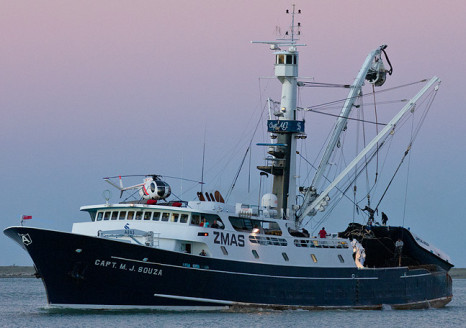 The one-year transitional arrangement for United States vessels for 2016 is a “positive development reflecting the value of rights-based fisheries management” for the Pacific islands, said the CEO of the Parties to the Nauru Agreement (PNA) today. The islands will receive higher fees for fewer fishing days than in the current agreement for 2015. The total package, including both U.S. industry payments and the U.S. government fisheries subsidy comes to US$89,271,350 for 2016. Read the rest here 11:25
The one-year transitional arrangement for United States vessels for 2016 is a “positive development reflecting the value of rights-based fisheries management” for the Pacific islands, said the CEO of the Parties to the Nauru Agreement (PNA) today. The islands will receive higher fees for fewer fishing days than in the current agreement for 2015. The total package, including both U.S. industry payments and the U.S. government fisheries subsidy comes to US$89,271,350 for 2016. Read the rest here 11:25
Tri Marine disappointed with outcome of tuna treaty talks
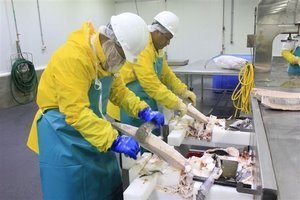 The Treaty governs access for US tuna boats to fish in the exclusive economic zones of Pacific island countries. Last year there was a drastic reduction in fishing days for the US fleet in waters around Kiribati while fishing fees shot up. He said without affordable fish supply, they will not be able to achieve their industry goals. To put it in a nutshell, Hamby said the American Samoa fishing fleet needs fishing grounds…fishing grounds that are not far away from American Samoa. For now Tri Marine’s new fish plant which was opened in January, Samoa Tuna Processors, Read the rest here 15:48
The Treaty governs access for US tuna boats to fish in the exclusive economic zones of Pacific island countries. Last year there was a drastic reduction in fishing days for the US fleet in waters around Kiribati while fishing fees shot up. He said without affordable fish supply, they will not be able to achieve their industry goals. To put it in a nutshell, Hamby said the American Samoa fishing fleet needs fishing grounds…fishing grounds that are not far away from American Samoa. For now Tri Marine’s new fish plant which was opened in January, Samoa Tuna Processors, Read the rest here 15:48
Negotiations for new US tuna deal fail
 South Pacific Tuna Company executives have reported that parties failed to agree on a long-term renewal of the 1987 South Pacific Tuna Treaty, which provides US purse seine vessels access to the Western and Central Pacific Ocean fisheries. “We don’t know what the lack of a US Treaty arrangement will mean to the future of the US fleet, its processors who rely on our supply in Samoa, or the other canneries on the Mainland, our service providers and employees. Read the rest here 15:38
South Pacific Tuna Company executives have reported that parties failed to agree on a long-term renewal of the 1987 South Pacific Tuna Treaty, which provides US purse seine vessels access to the Western and Central Pacific Ocean fisheries. “We don’t know what the lack of a US Treaty arrangement will mean to the future of the US fleet, its processors who rely on our supply in Samoa, or the other canneries on the Mainland, our service providers and employees. Read the rest here 15:38
American Samoa – Loss of purse seiners will be catastrophic
 The Chairman of the Governor’s Fisheries Task Force, Solip Hong, says there will be catastrophic effects for the territory’s economy if the current fleet of US purse seiners pack up due to loss of fishing grounds in near waters. The purse seiners face a bleak future because of a drastic reduction in fishing days under the South Pacific Tuna Treaty in waters near Kiribati that the local purse seine fleet used to ply. Read the rest here 18:57
The Chairman of the Governor’s Fisheries Task Force, Solip Hong, says there will be catastrophic effects for the territory’s economy if the current fleet of US purse seiners pack up due to loss of fishing grounds in near waters. The purse seiners face a bleak future because of a drastic reduction in fishing days under the South Pacific Tuna Treaty in waters near Kiribati that the local purse seine fleet used to ply. Read the rest here 18:57
Angler lands 1,368-pound blue marlin from 21-foot boat; just shy of world record
 An angler fishing off Kona, Hawaii, landed a 1,368-pound blue marlin on Tuesday, while fishing aboard a 21-foot skiff. The massive billfish, caught by Guy Kitaoka aboard the vessel Dayna, is the largest blue marlin caught off Kona in 23 years, and is only eight pounds shy of the world record, a 1,376-pound blue caught off Kona in 1982. However, Kitaoka was using an electric reel, so even if the fish had been nine pounds heavier, it could not have qualified as a world record. (The angler holds a commercial-fishing license and was fishing for tuna and billfish to sell,,, Read the rest here 15:12
An angler fishing off Kona, Hawaii, landed a 1,368-pound blue marlin on Tuesday, while fishing aboard a 21-foot skiff. The massive billfish, caught by Guy Kitaoka aboard the vessel Dayna, is the largest blue marlin caught off Kona in 23 years, and is only eight pounds shy of the world record, a 1,376-pound blue caught off Kona in 1982. However, Kitaoka was using an electric reel, so even if the fish had been nine pounds heavier, it could not have qualified as a world record. (The angler holds a commercial-fishing license and was fishing for tuna and billfish to sell,,, Read the rest here 15:12
Hawaii’s longline fishermen on course to hit bigeye limit – Enviros sue
 Hawaii’s longline fishermen are on course to hit their annual bigeye tuna catch limit next week, which means they will have to stop catching bigeye in their most productive fishing grounds west of Hawaii on Aug. 5. Hawaii fishermen will still be able to catch bigeye in eastern waters regulated by a different fisheries commission. Several environmental groups say attributing catch to territories — which allows Hawaii fishermen to effectively double their catch — is illegal and have sued to stop the practice. Read the rest here 07:59
Hawaii’s longline fishermen are on course to hit their annual bigeye tuna catch limit next week, which means they will have to stop catching bigeye in their most productive fishing grounds west of Hawaii on Aug. 5. Hawaii fishermen will still be able to catch bigeye in eastern waters regulated by a different fisheries commission. Several environmental groups say attributing catch to territories — which allows Hawaii fishermen to effectively double their catch — is illegal and have sued to stop the practice. Read the rest here 07:59
The American Samoa Fisheries Task Force needs support for petition
 The American Samoa Fisheries Task Force is urging support for a petition that’s been filed with the National Oceanic and Atmospheric Administration to exempt US purse seines that deliver at least 50% of their catch to the American Samoa canneries, from the limits on high seas fishing effort for 2015. Last year NOAA set limits on fishing days by the US purse seine tuna fleet in Pacific waters but that limit only applied to 2014. Read the rest here 21:41
The American Samoa Fisheries Task Force is urging support for a petition that’s been filed with the National Oceanic and Atmospheric Administration to exempt US purse seines that deliver at least 50% of their catch to the American Samoa canneries, from the limits on high seas fishing effort for 2015. Last year NOAA set limits on fishing days by the US purse seine tuna fleet in Pacific waters but that limit only applied to 2014. Read the rest here 21:41
Tri Marine is asking for an emergency exemption for American Samoa fishing fleet
 Earlier this year, as a conservation measure, the National Oceanic and Atmospheric Administration closed off an area of ocean to the U.S flagged fishing fleets. The closure means Tri Marine’s fleet of 12 purse seiners based in American Samoa will struggle to supply enough tuna to Samoa Tuna Processors cannery. Tri Marine is asking for an emergency exemption based on the limited fishing grounds now available to the American Samoa-based purse seiner fleet. Read the rest here 14:48
Earlier this year, as a conservation measure, the National Oceanic and Atmospheric Administration closed off an area of ocean to the U.S flagged fishing fleets. The closure means Tri Marine’s fleet of 12 purse seiners based in American Samoa will struggle to supply enough tuna to Samoa Tuna Processors cannery. Tri Marine is asking for an emergency exemption based on the limited fishing grounds now available to the American Samoa-based purse seiner fleet. Read the rest here 14:48
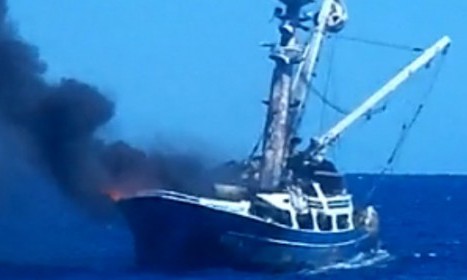
Honor, Respect, Devotion to Duty: Crew of F/V Cape Ferret
In November 2014, the crew of F/V Betty C awoke to find their vessel nearly engulfed in flames. After their attempts to extinguish the flames proved ineffective, the captain gave a singular order that no mariner ever wants to hear: Abandon ship. The crew huddled into their small rescue skiff, watching their vessel, and home while at sea, smolder and burn. Two hundred and thirty miles south of Jarvis Island, Hawaii, it seemed unlikely for a quick rescue. But little did they know that their EPIRB had given their position to the Coast Guard Joint Rescue Coordination Center in Honolulu, allowing the Coast Guard to both pinpoint their location and the location of a nearby vessel to call for possible assistance. That vessel was the F/V Cape Ferret. Read the rest here 14:48
HONOLULU – State Land Board approves emergency ban on sea cucumber harvesting
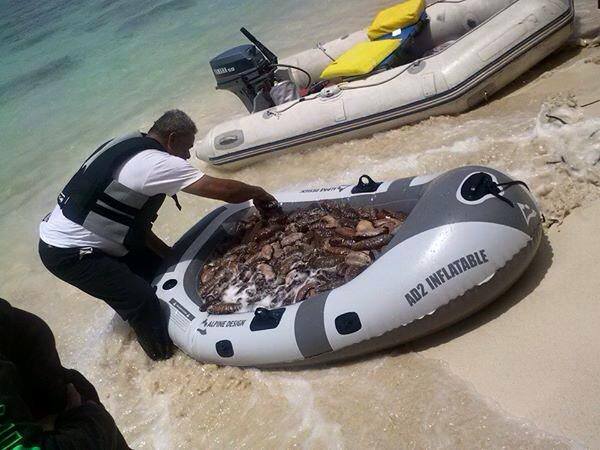 A snapshot of a boatload of sea cucumbers taken recently in Waimanalo got people’s attention, but not in a good way. Land board members heard from Native Hawaiians who say even though they worry about how their cultural gathering rights will be affected, they support this temporary ban on the taking of sea cucumbers.“It’s a boom or bust fishery. The fishermen can collect a large number of animals in a small amount of time.” Alton Miyasaka, Aquatic Resources, said 17 people recently applied for commercial fishing licenses. Read the rest here 09:28
A snapshot of a boatload of sea cucumbers taken recently in Waimanalo got people’s attention, but not in a good way. Land board members heard from Native Hawaiians who say even though they worry about how their cultural gathering rights will be affected, they support this temporary ban on the taking of sea cucumbers.“It’s a boom or bust fishery. The fishermen can collect a large number of animals in a small amount of time.” Alton Miyasaka, Aquatic Resources, said 17 people recently applied for commercial fishing licenses. Read the rest here 09:28
NOAA Spends $25 Million for 2015 Recommended Projects of the Saltonstall-Kennedy Grant Program
 Today, NOAA Fisheries announced that it is recommending 88 projects for a total of $25 million under the 2014-2015 Saltonstall-Kennedy (SK) Grant Program. This is the most significant amount of funding ever granted by NOAA under this decades-old program. The recommended projects — which represent every region of the country and U.S. territories — are listed below. Read the rest here 17:17
Today, NOAA Fisheries announced that it is recommending 88 projects for a total of $25 million under the 2014-2015 Saltonstall-Kennedy (SK) Grant Program. This is the most significant amount of funding ever granted by NOAA under this decades-old program. The recommended projects — which represent every region of the country and U.S. territories — are listed below. Read the rest here 17:17
WPFMC question proposed rule on green sea turtles, address allocation of US tuna catches
 The council’s Scientific and Statistical Committee and Protected Species Advisory Committee noted a lack of transparency in the criteria used to make the status determinations, questionable interpretation of existing research and gaps in information considered. The Scientific and Statistical Committee, for example, said the proposal to continue to list the Hawai’i green turtle as threatened is contrary to analysis that showed zero chance of decline in the population in the foreseeable future. Read the rest here 20:15
The council’s Scientific and Statistical Committee and Protected Species Advisory Committee noted a lack of transparency in the criteria used to make the status determinations, questionable interpretation of existing research and gaps in information considered. The Scientific and Statistical Committee, for example, said the proposal to continue to list the Hawai’i green turtle as threatened is contrary to analysis that showed zero chance of decline in the population in the foreseeable future. Read the rest here 20:15
Department of Commerce announces 2015 regional fishery council appointments
 The U.S. Commerce Department today announced the appointment of 30 new and returning members to the eight regional fishery management councils that partner with NOAA, and National Marine Fisheries Service to manage ocean fish stocks. The new and reappointed council members begin their three-year terms on August 11. Read the rest here 15:25
The U.S. Commerce Department today announced the appointment of 30 new and returning members to the eight regional fishery management councils that partner with NOAA, and National Marine Fisheries Service to manage ocean fish stocks. The new and reappointed council members begin their three-year terms on August 11. Read the rest here 15:25
State of Hawaii proposes emergency ban following mass harvesting of sea cucumbers
 The Department of Land and Natural Resources is proposing an emergency rule that will ban any taking of sea cucumbers for the next 120 days. The move comes as officials report a new commercial fishery that mass harvests sea cucumbers on both Oahu and Maui. Photos on social media show sea cucumbers being harvested by the hundreds, possibly thousands at a time, from a beach in Waimanalo. Currently Hawaii has no specific rules governing the take of sea cucumbers and, while taking sea cucumbers from the ocean is not against the law,,, Video, Read the rest here 16:35
The Department of Land and Natural Resources is proposing an emergency rule that will ban any taking of sea cucumbers for the next 120 days. The move comes as officials report a new commercial fishery that mass harvests sea cucumbers on both Oahu and Maui. Photos on social media show sea cucumbers being harvested by the hundreds, possibly thousands at a time, from a beach in Waimanalo. Currently Hawaii has no specific rules governing the take of sea cucumbers and, while taking sea cucumbers from the ocean is not against the law,,, Video, Read the rest here 16:35
Fresh fish are auctioned at Hawaii pier, the largest in the United States
 As the sun rises over Honolulu, commercial fisherman have already unloaded their catches and docked their boats for the day. The fish are lined up on pallets, packed in ice and displayed for buyers to inspect. The auction is the largest in the United States and one of the largest in the world. It’s the only fish auction between Tokyo and Maine, and, according to the company, the only tuna auction of its kind in the nation. Photos, Read the rest here Additional photo’s here 07:04
As the sun rises over Honolulu, commercial fisherman have already unloaded their catches and docked their boats for the day. The fish are lined up on pallets, packed in ice and displayed for buyers to inspect. The auction is the largest in the United States and one of the largest in the world. It’s the only fish auction between Tokyo and Maine, and, according to the company, the only tuna auction of its kind in the nation. Photos, Read the rest here Additional photo’s here 07:04






 Of the 469 stocks managed by the eight regional fishery management councils, the status of 161 stocks is unknown for lack of stock assessments. In the South Atlantic, of the 59 species in the snapper-grouper fishery, the stock status is unknown for 76 percent or 45 species. Additionally, the status is unknown for important top-water species like dolphin (mahi) and wahoo. For stocks with an unknown status, the only way to set an annual catch limit is to use historical landings, which has no real scientific basis, and can unfairly penalize fishermen with artificially low catch limits. Instead of devoting adequate financial resources into stock assessments, NOAA has spent about $160 million over the last six years pushing its National Catch Share Program,,,
Of the 469 stocks managed by the eight regional fishery management councils, the status of 161 stocks is unknown for lack of stock assessments. In the South Atlantic, of the 59 species in the snapper-grouper fishery, the stock status is unknown for 76 percent or 45 species. Additionally, the status is unknown for important top-water species like dolphin (mahi) and wahoo. For stocks with an unknown status, the only way to set an annual catch limit is to use historical landings, which has no real scientific basis, and can unfairly penalize fishermen with artificially low catch limits. Instead of devoting adequate financial resources into stock assessments, NOAA has spent about $160 million over the last six years pushing its National Catch Share Program,,, 